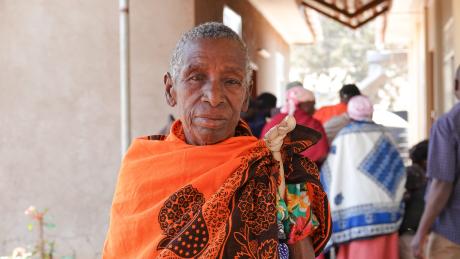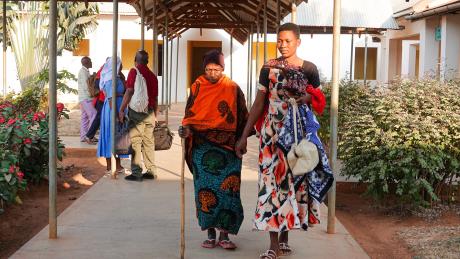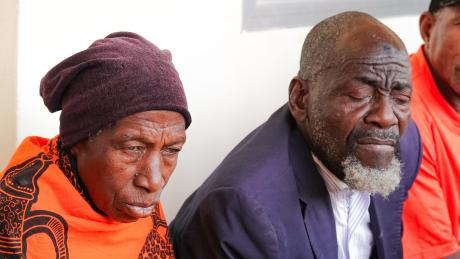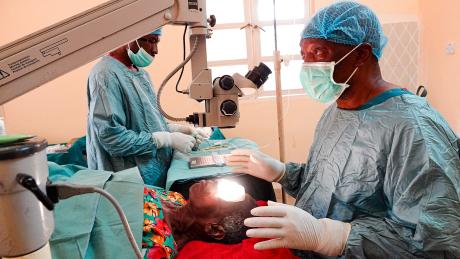
Rozalia’s transformative journey began when Mission Aviation Fellowship flew an eye surgeon to her region, performing life-changing cataract surgery that restored her sight. But Rozalia’s life was not the only one changed.
Story by Annet Nabbanja
“The blindness incapacitated me,” said Rozalia Masanja Mayunga. “I thought I was going to die.”
Rozalia is from Nkinga village in Central Tanzania, and known affectionately as Bibi – the Swahili word for grandmother. She lost her sight two and a half years ago. What started with her right eye soon affected the left, leaving the 75-year-old completely blind.
Once active in her home and shamba (farm), without sight Rozalia could no longer care for herself. She became fully dependent on her granddaughter, Cecilia Sylvanus Tanganyika, who had to help with everything.
“Every day I prayed, ‘My God help me. I am tired of this kind of suffering,’” Rozalia said. “Even children would disrespect me. I’d ask for water and they’d say, ‘Go yourself. Don’t you have legs?’”

Cecilia described Rozalia’s life before surgery.
“We had a lot of trouble,” Cecilia said. “I would want to do work, but she still needed to be helped. I had to escort her everywhere.
“I’d be sleeping, and she’d wake me up to help. Everywhere I would go with her. I would go somewhere and delay, then remember that I have a sick person at home.”
Rozalia’s story changed when Mission Aviation Fellowship flew Dr Erick Msigomba and his team from Njombe to the Tabora region to help patients blinded by cataracts. Rozalia was one of the patients whose life was changed by the renowned Tanzanian eye specialist’s work.
“There is no one doing eye surgery in Tabora,” said Dr Msigomba. “Even the regional hospital has no eye doctor.
“Most patients are suffering from blindness that can be reversed, especially cataracts. But only those with money can afford to go to city hospitals. Many just stay blind.”
The blindness incapacitated me.
The surgical equipment the team carried was too fragile for the rough, two-day road journey. MAF’s flight made the outreach possible.
“These machines are very delicate,” Dr Msigomba said. “You can’t carry them 1,000 kilometres by car or bus. There are too many bumps – and it takes two days, day and night, to drive. MAF dropped me safely with my equipment.
“I am a retired doctor. I was sitting at home, and MAF came and asked me. Now you are making me help people. And so, now you have started, don’t stop.”
Hope returned for Rozalia when she heard that doctors were coming to Kaliua, a place over 130 kilometres from Tabora.
“I was told by my children that doctors were coming. I made up my mind to go for treatment. I was so excited about it,” she said.

Rozalia was one of 60 patients who received cataract surgery.
“They removed like a scarf from my eyes, and I started seeing,” she said. “I saw the door; I could see people standing outside. I was happy to see people again. I said, ‘I have seen!’”
Her healing was immediate.
“I can’t forget the journey. I am healed. For sure I am healed. I can’t tell it all.
“Now I can walk on my own,” Rozalia added. “I’ll go myself. I’ll not be hungry. I’ll cook and eat instead of begging people. They will see me at home walking, and they will be shocked.”
Cecilia was relieved.
“I was very happy,” Cecilia said. “We laughed because Bibi has seen!”

Dr Msigomba emphasised that restoring sight does more than just improve individual lives.
“A blind patient cannot generate their own income. They can even stop children from going to school because they stay home taking care of the blind person.
“But if you take out the cataract and the patient is able to see, they go back to farming, to the shamba and release children to go to school.”
Pilot Peter Griffin, who flew the surgical team to Tabora, witnessed the significance of that surgical outreach.
“The impact of that one visit is still being felt,” he said. “People who had been blind for years could suddenly see again. Imagine the joy of watching someone open their eyes and look at their family for the first time in so long.”
A blind patient cannot generate their own income. They can even stop children from going to school.
“These surgeries didn’t just restore sight,” Peter added. “They restored independence, the ability to work again, and provide for their families. And all of it began with a single flight.”
As Rozalia returned home, her heart was full. Her life was transformed. As a result, Cecilia’s life was transformed too.
“Nimeona (I have seen). I pray for God’s grace,” Rozalia said. “Because eyes are my hands.”